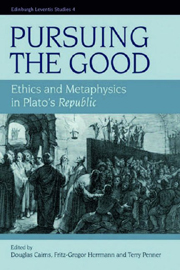Book contents
- Frontmatter
- Contents
- Preface
- Contributors and Editors
- Introduction
- 1 What is the Form of the Good the Form of? A Question about the Plot of the Republic
- 2 Glaucon's Challenge, Rational Egoism and Ordinary Morality
- 3 Thrasymachean Rulers, Altruistic Rulers and Socratic Rulers
- 4 Neutralism in Book I of the Republic
- 5 The Good, Advantage, Happiness and the Form of the Good: How Continuous with Socratic Ethics is Platonic Ethics?
- 6 The Form of the Good and the Good in Plato's Republic
- 7 Flourishing: The Central Concept of Practical Thought
- 8 Is Plato's Conception of the Form of the Good Contradictory?
- 9 The Good, Essences and Relations
- 10 The Idea of the Good and the Other Forms in Plato's Republic
- 11 The Aporia in the Charmides about Reflexive Knowledge and the Contribution to its Solution in the Sun Analogy of the Republic
- 12 The Good and Mathematics
- 13 The Good and Order: Does the Republic Display an Analogy Between a Science of Ethics and Mathematics?
- 14 Inquiry and Justification in the Search for the Highest Good in Plato and Aristotle
- 15 The Carpenter and the Good
- 16 Conversion or Conversation? A Note on Plato's Philosophical Methods
- Index
4 - Neutralism in Book I of the Republic
Published online by Cambridge University Press: 12 September 2012
- Frontmatter
- Contents
- Preface
- Contributors and Editors
- Introduction
- 1 What is the Form of the Good the Form of? A Question about the Plot of the Republic
- 2 Glaucon's Challenge, Rational Egoism and Ordinary Morality
- 3 Thrasymachean Rulers, Altruistic Rulers and Socratic Rulers
- 4 Neutralism in Book I of the Republic
- 5 The Good, Advantage, Happiness and the Form of the Good: How Continuous with Socratic Ethics is Platonic Ethics?
- 6 The Form of the Good and the Good in Plato's Republic
- 7 Flourishing: The Central Concept of Practical Thought
- 8 Is Plato's Conception of the Form of the Good Contradictory?
- 9 The Good, Essences and Relations
- 10 The Idea of the Good and the Other Forms in Plato's Republic
- 11 The Aporia in the Charmides about Reflexive Knowledge and the Contribution to its Solution in the Sun Analogy of the Republic
- 12 The Good and Mathematics
- 13 The Good and Order: Does the Republic Display an Analogy Between a Science of Ethics and Mathematics?
- 14 Inquiry and Justification in the Search for the Highest Good in Plato and Aristotle
- 15 The Carpenter and the Good
- 16 Conversion or Conversation? A Note on Plato's Philosophical Methods
- Index
Summary
EGOISM, ALTRUISM AND NEUTRALISM DEFINED
Some ethical theories are based upon a descriptive account of what is intrinsically desirable for human beings, taken to be an objective good. Call any such theory perfectionism. Egoism and altruism are species of perfectionism, each making the good relative to the agent, either himself or his others. An example of an egoist perfectionist is the Callicles featured in Plato's Gorgias. For he defines the good in such terms: ‘Here is what is fine and just by nature … that he who would live rightly should allow his appetites to get as big as possible and … satisfy each appetite in turn with what it desires’ (491E–492A). Perhaps another example of an egoist perfectionist is Raskolnikov in Dostoyevski's Crime and Punishment. In contrast to Raskolnikov's egoism, Dostoyevski's character Sophie seems to exemplify altruism, willing to degrade herself for the sake of others. Both altruist and egoist make the good relative to the agent, either the agent's self or the agent's others. In contrast to agent-relative accounts, the utilitarian John Stuart Mill is an agent-neutral perfectionist: what matters is only the amount of good life, not whose good life it is. Such an account of the good differs from egoism and altruism in not making the good relative to the agent.
NON-PHILOSOPHERS, PHILOSOPHERS AND THE WISE DEFINED
In the Apology Socrates distinguishes three levels of attainment of wisdom ‘of the excellence proper to a human being and citizen’ (τῆςτоιαύτης άρετῆς, τῆς άνθρωπίνης τε καί πоλιτκῆς, 20B4–5).
- Type
- Chapter
- Information
- Pursuing the GoodEthics and Metaphysics in Plato's Republic, pp. 76 - 92Publisher: Edinburgh University PressPrint publication year: 2007



